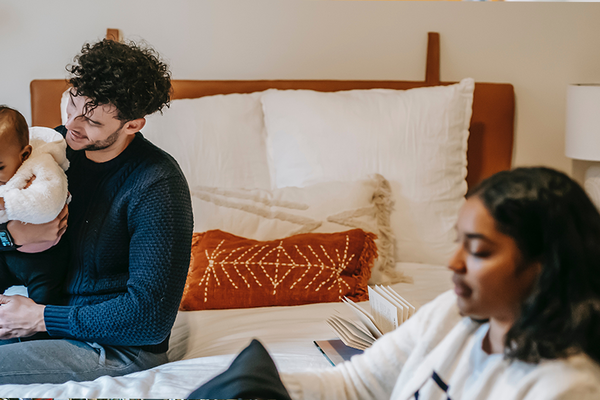How to kickstart your career in Denmark?
Are you looking for a job in Denmark after graduating? Or perhaps you want to get a head start with a student job during your studies?
The University of Copenhagen (UCPH) is more than just education. UCPH wants to secure the future for graduates and believes that studies go hand in hand with applying your knowledge in a job.
Keep in mind that:
- Most degree programmes offer the opportunity to do an internship and earn credits
- Internships may result in a career-promoting student job
- Writing a project or your master’s thesis together with a business often leads to a full-time job after graduation.
The UCPH Job & Project Portal helps bring students and businesses together. Students can also draw upon faculty-based or external talent programmes and services.
Job search tips for international alumni and graduates
Finding a job in Denmark—whether it’s a student job or a position after graduation—can feel overwhelming, especially when you’re unfamiliar with a new country’s job market.
Fortunately, there are many strategies to help you discover opportunities both during and after your studies.
Read on and watch the videos to learn valuable advice on networking and job searching from 5 career experts and counsellors who share their top tips.
Job search tips
Networking is important when looking for a job in Denmark. Mainly because many positions in private businesses are not advertised. Instead they are filled through personal contacts. This may be good to bear in mind if you meet someone when doing sports, picking up your children from day-care, attending an event etc.
Networking is an important part of job searching, and you should always use the opportunity to talk to others at an event; they could be the path to your first or new job in Denmark.
Learn about networking activities for international students in Copenhagen
Doing volunteer work in Denmark may also expand your network and further develop your skills. You can look for volunteer activities at International House and your municipality. Many organisations post ’leadership demanding’ volunteer jobs at Volunteering.dk.
Studenterhuset is another place where you can volunteer, drink cheap coffee and make international friends at the same time. Studenterhuset has around 200 volunteers with around 40 nationalities.
In general volunteering is not just a great way to improve your chances of getting a job and career in Denmark. It is also a great way to practice your Danish language skills as some Danes may not be as compelled as your young classmates to speak English in every given situation.

As an international student in Denmark, it is not unusual to collaborate with a company, organisation or NGO when writing your master’s thesis or project assignment. This is a popular choice among students who want to strengthen their career opportunities and gain practical experience alongside their studies.
Working with a company allows you to explore real-life challenges and learn about workplace culture in Denmark. Research shows that such collaborations often lead to full-time employment after graduation – for both Danish and international students.
If you are unsure where to start, ask your lecturers or fellow students for advice and inspiration.
It is your responsibility to find a collaboration partner. Unless your professor or lecturer suggests otherwise, your thesis or project must be connected to your courses and comply with academic rules and regulations.
Start planning early and discuss your ideas with your lecturer or professor to make the most of your experience in Denmark.
In Denmark, it is popular to do an internship. An internship is a unique opportunity to get experience and develop your skills. In some cases, internships can result in permanent employment. When doing an internship, you can often earn credits as part of your degree programme while also getting the experience of using your skills in the real world before graduating.
You can look for internships online at UCPH Job & Projects. You can contact companies, organisations and NGOs yourself or get help from a staff member in your department.
Prepare for a career in Denmark while studying at UCPH
Graduates with practical experience are attractive to employers.
Here are a few suggestions for you to consider, if you want to prepare for a career in Denmark while being a student at UCPH.
How to network with companies
Networking is important when looking for a job in Denmark. Learn how to approach the process here.
Perfecting your pitch
Learn how to perfect your pitch when talking to potential employers.
Turn your motivation and skills into opportunities
Learn how to stand out in your job search with advice from a Novozymes department manager who knows what international candidates can bring to the table.
How to write a good job application
Learn how to write a good application that land you job interviews.
Job and career programmes for international students
Do you want to boost your career in Denmark?
Then you should take your studies further with UCPH career programmes for international students. Gain real-world experience, connect with mentors and companies, and get the confidence to launch your career in Denmark.
Greater Copenhagen Career Network
Young Professionals in Copenhagen
Head Start
Career kick Start
Career services at UCPH
UCPH does not have a central career service centre. Many activities are based at faculty or programme level.
This means that as a student you will get different information from KUnet (the UCPH intranet) and news depending on what you are studying. You must be enrolled to see offers that are relevant for you.
- The Faculty of Social Sciences announces career events for international students on their Facebook page. Topics: CV writing, ‘Stand Out in the Crowd’, meet with employers, unions, etc.
- The Faculty of Science offers several career events for all their students within areas such as how to get a student job, project collaboration, LinkedIn, ect. Students also have the possibility to book an individual career guidance session. Some programmes also offer programme related activities - for instance Computer Science.
UCPH Alumni – Career Stories from Denmark
My Danish career - Andrea Gravrilescu
Meet Andra Gravrilescu - a former student at our MA program in Film and Media Studies. Listen to Andra's story about how to build a career in Denmark after graduation.
My Danish career - Claire Joyce
Meet Claire Joyce - a former student at our MA program in IT & Cognition. Listen to Claire's story about how to build a career in Denmark after graduation.
My Danish career - meet 5 of UCPH's former international students
Meet five of UCPH's former international master students and listen to their stories about how to build a career in Denmark.
Job portals in Denmark
In Denmark, you will find a wide range of job portals – from the well-known to the more specialised.
We recommend starting with the University of Copenhagen’s own job portal, where you can explore job opportunities, including positions aimed at graduate students.
If you wish to work at or for UCPH, you can check out UCPH's own job portal. Here you can find both PhD and Postdoc positions, teaching positions, faculty and academic positions.
UCPH Job portal
Use UCPH Project & Job, UCPH's job portal, exclusive to students and alumni from UCPH.
Other job portals in Denmark
Furthermore, you could consider to visit the following job portals:
Jobindex
Denmark’s largest job portal with thousands of listings, many in English, and easy search tools for international candidates.
WorkinDenmark
Official portal for international jobseekers with many English-language listings and guidance on working in Denmark.
Head Start
Job openings in Central Demark with full-time positions, academic positions, internships and student jobs for international job seekers.
Graduateland
Large European portal with graduate jobs and internships, many advertised in English.
Work permit in Denmark
Please note: Changes to the rules for residence and work permits in Denmark may be introduced.
These changes may affect the duration of residence and work permits.
For the latest updates, please visit nyidanmark.dk/en-GB/.
Work permit in Denmark
Do you want to get a job and career in Denmark after graduation? And do you want to know about your work rights in Denmark?
The study permit allows you work in Denmark for 3 years on a part-time salary. However, when you get more than 20 hours work per week, you must apply for a work visa.
International House Copenhagen
One-stop for registration for a CPR number, EU residence document, events, and career programmes to welcome newcomers to Copenhagen.
Learning Danish on campus
UCPH collaborates with the local, publicly funded language school UCplus. As an international student at UCPH, you can sign up for Danish language courses on campus. You can attend at both beginner, intermediate and advanced levels. Learning Danish will improve your chances of getting a job and career in Denmark.
Bring your family to Denmark

Can I bring my family to Denmark?
If you are offered a work and residence permit, you can bring your partner and your children (if they are under 18 and still live at home).
Childcare and schools in Denmark
In Denmark, most children between the ages of 0 to 5 are enrolled in day-care centres before they start primary school.
Unemployment insurance funds and trade unions
Academic trade unions
Trade unions for academics in Denmark offer services such as legal advice on employment matters and assistance on negotiating salaries and working conditions with the employers. They also offer free job searching guidance for its members
There are plenty of Danish academic unions to choose from. The Danish Confederation of Professional Associations (AC - Akademikerne) is an umbrella organisation for its member organisations.
Find a relevant trade union in Denmark
Unemployment benefits during your job search
If you are unemployed in Denmark, you may, as a graduate in Denmark, be entitled to “dagpenge” (unemployment benefits). They funds can tell you all about conditions for obtaining unemployment benefits. Since May 2023, one of the conditions for obtaining unemployment benefits has changed. One of the new rules is that you must know and speak the Danish language at the level of "Dansk 2".
Unemployment funds, along with unions, are great sources of help to finding a job. They offer online and in-person events, online guidance and much more.
